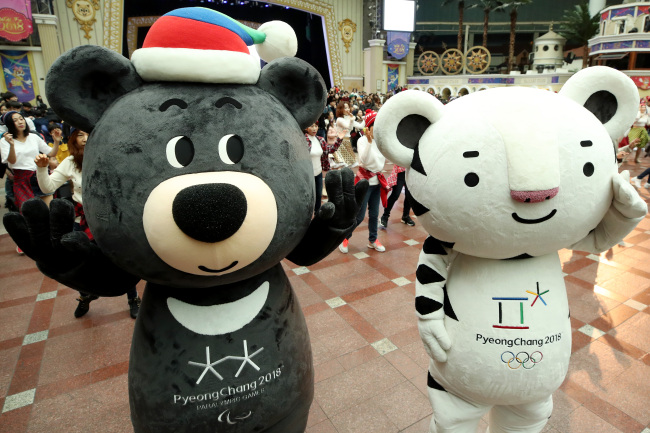[PyeongChang 2018] Meet the 2018 PyeongChang Olympics mascots: Soohorang and Bandabi
By Sohn Ji-youngPublished : Feb. 5, 2018 - 17:28
At every Olympic Game, there is a unique mascot which bolsters Olympic spirit while promoting the culture and values of the event’s host city and country.
And in South Korea, a white tiger named Soohorang and an Asiatic black bear named Bandabi will each be representing the Olympic and Paralympic Winter Games set to kick off in PyeongChang this week.
There is a rich symbolism and culture behind the two animals, which are closely associated with Korean traditional folklore and mythology.
And in South Korea, a white tiger named Soohorang and an Asiatic black bear named Bandabi will each be representing the Olympic and Paralympic Winter Games set to kick off in PyeongChang this week.
There is a rich symbolism and culture behind the two animals, which are closely associated with Korean traditional folklore and mythology.

Soohorang takes its motif from the white tiger, long considered to be a sacred guardian animal in Korea. Its white fur also links the animal to many of the snow and ice sports in the Winter Games.
As for its name, “Sooho,” meaning protection in Korean, symbolizes the protection offered to the athletes, spectators and other participants of the 2018 Games.
“Rang” comes from the middle name of “Ho-rang-i,” the Korean word for “tiger” and is also the last letter of “Jeong-seon A-ri-rang,” a traditional folk song of Gangwon Province, where the Games will be held, according to the Olympics website.
“Soohorang not only has a challenging spirit and passion, but is also a trustworthy friend who protects the athletes, spectators and all the participants of the Olympic Games,” the website reads.
Moreover, Soohorang is not the first tiger to serve as an Olympic mascot in Korea. During the 1988 Seoul Summer Games, an orange Amur tiger named Hodori was the official mascot.
Alongside the white tiger mascot, Bandabi the Asiatic bear has been tapped as the mascot for the 2018 Paralympic Games in PyeongChang.
In Korea, a bear has traditionally symbolized strong will and courage, which aligns with the Olympic spirit. The Asiatic bear in particular is also the symbolic animal of Gangwon Province which houses PyeongChang and the Olympic venues.
As for the name “Bandabi,” the word “banda” comes from “bandal” meaning “half-moon” to reflect the white crescent shape found on the chest of the Asiatic black bear. “Bi” is a suffix in Korean that stands for the celebration of something. In this case, it’s the Paralympics.
The PyeongChang Organizing Committee for the 2018 Olympic and Paralympic Winter Games has set up official merchandise stores selling Soohorang and Bandabi goods across Seoul as well as the Olympic venues across PyeongChang and its surrounding regions.
By Sohn Ji-young (jys@heraldcorp.com)








![[Kim Seong-kon] Democracy and the future of South Korea](http://res.heraldm.com/phpwas/restmb_idxmake.php?idx=644&simg=/content/image/2024/04/16/20240416050802_0.jpg&u=)









![[Today’s K-pop] Zico drops snippet of collaboration with Jennie](http://res.heraldm.com/phpwas/restmb_idxmake.php?idx=642&simg=/content/image/2024/04/18/20240418050702_0.jpg&u=)